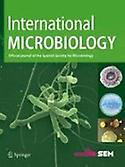Today Tuesday 29 we had a session dedicated to the relationship between microorganisms and global change. Among the different presentations, the Dr. Emili Montesinos, from the University of Girona, has told us about how climate change can affect the emergence of emerging diseases that are affecting agriculture. He has illustrated this with two examples: the emerging bacteria Xylella annoying, which is spreading in Europe causing damage to olive, almond, vineyard and citrus crops; and Erwinia amylovora, another bacterium that affects fruit trees such as apple or pear trees, which appeared in Spain at the beginning of the 21st century. On the other hand, global climate change will lead to an increase in temperature and a decrease in rainfall. In his talk, he has shown us that they are investigating how various factors influence the increase in these microbial diseases, through empirical models that are based on experimental studies. The drought will have an influence by decreasing those microorganisms that live in the aerial parts of the plants, but once the epidemic is established in the crops, the heat would increase the speed of disease progression. Other factors would be the increase in CO2 in the environment, which facilitates an increase in plant mass so that pathogenic bacteria have more substrate to feed on; or the increase in ultraviolet radiation, due to damage to the ozone layer, which would harm other microorganisms. In short, and in conclusion, he told us that these predictive models foresee an increase, both in the incidence and in the expansion, of these emerging diseases in crops, but that at the same time more research is needed to stop or prevent these and other emerging diseases.
On the other hand, the Dr. Carlos Pedrós, from the University of Seville, has explained to us how diverse and changing the microbial world is, from the beginning of life, because at every moment we are discovering new taxa. For example, in water it is estimated that we have approximately 10(29) microbial cells, many of them frozen for more than eight million years still in the "natural freezers" that the Earth has, which can wake up with global change and thus interact with the rest of the microbial populations. Some of the water-dwelling species are predominant, while others are more rare. If environmental changes occur, the rare ones can occupy the niches of the abundant ones, changing the balances between all the populations. Among those that predominate, an example is Arcobacter, detecting a cell of this kind for every 10 liters of water, equivalent to finding a person on the entire Earth. He has also explained to us how the appearance of life could be predicted starting from microorganisms: the appearance of cyanobacteria meant a decrease in methane and environmental CO2, to favor the appearance of oxygen and thus the evolution of life to the present day. He has illustrated how microorganisms have great adaptability to the changing environment, but with global change we are going very fast, drawing a parallel with driving a Formula 1 car and suggesting that we should take our foot off the accelerator...
Summary prepared by Dolo Vidal Roig, from the University of Castilla-La Mancha.





No comment yet, add your voice below!